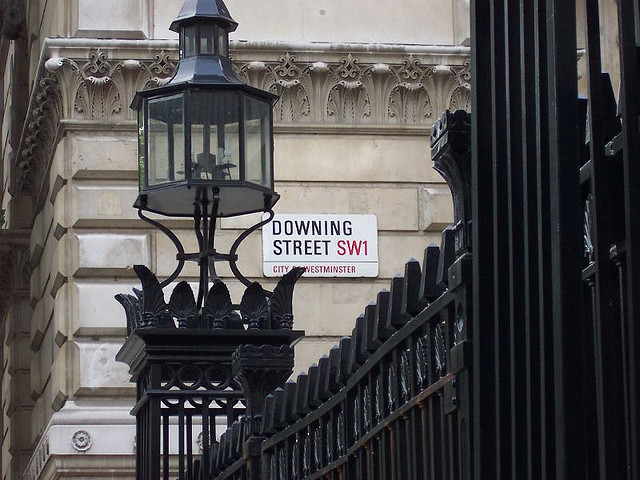Reshuffles tend to have little impact on the polling position of the governing party
There has been much recent speculation as to whether the Prime Minister will use this week to reshuffle his Cabinet, and whether any such reshuffle will see an influx of new faces. But do government reshuffles have any impact whatsoever on voting intention? Rich Durber argues that the impact varies, but by and large they tend to have very little impact on the polling position of the party which carries out the reshuffle.
This week’s cabinet reshuffle will probably be David Cameron’s last before the general election. Reshuffles are big events in Westminster and the preparatory rituals have already been completed for this one. Weeks of speculation about the date of the reshuffle, check. Widely varying predictions by commentators as to who’s in and who’s out, check. Use of the term ‘big beast’ to describe any minister over the age of 55, check and double check.
Now the Government’s media strategy moves to it’s final stage – establishing the narrative. This usually begins before the reshuffle and will continues until all the appointments are finalised. In essence it’s Number Ten’s attempt to package all the ministerial changes into a simple story for the press and through them the public.
Typically this will consist of phrases like ‘a continuity reshuffle’ if things are going well, a ‘wielding of the axe’ if they are not and that New Labour favourite of ‘putting reformers in key positions’. In the past we’ve also been treated to a more ambitious efforts like ‘the flat cap reshuffle’, ‘a Government of all the talents’ and who could forget the groan-worthy ‘night of the long drives’
This time, if the past few day’s reports are accurate, the narrative is the replacement of “old men with young women”. The reshuffle will therefore be judged on whether this is merely a cosmetic exercise by a government with a dire record of appointing women to senior roles in Government, or something more meaningful.
But while we wait to find out the answer to that, it’s perhaps worth asking what effect, if any, these carefully choreographed narratives actually have on the public. To find out I’ve examined the polling around every major reshuffle going back to the election of Margaret Thatcher.
The results are in the table below.
Table 1: The impact of Governing party reshuffles on voting intention figures
As you can see, the most striking finding from the data is how little impact reshuffles seem to have on the governing parties ratings. Of the 17 reshuffles I looked at, 12 of them led to poll movements of less than 3% either positively or negatively – well within the margin of error of most opinion polls.
The few statistically significant poll movements which did occur outside the margin of error were predominantly negative. If they were hoping for a positive poll bounce from their reshuffles, most recent prime ministers will have been disappointed.
This would seem to give weight to the theory which Francis Elliott floated inThe Times this week that reshuffles “instead of showcasing power…have a tendency to advertise weakness”.
This would certainly seem to be true in John Major’s case, who was the unluckiest reshuffler in the study and saw his popularity decline each time he changed his cabinet . Examination of his first midterm reshuffle in May 1993 perhaps shows why. Held in the shadow of a crushing loss in the Newbury by-election earlier in the month, Major had promised a reshuffle to ‘freshen up the cabinet’. The reality turned out to be somewhat different.
Although six ministers switched departments there was only one new entry to cabinet, John Redwood who was promoted to Welsh Secretary. The only departure was the surprise resignation of the Chancellor, Norman Lamont, who left cabinet despite John Major’s offer of the post of Environment Secretary.
As a result of so few substantial changes in personnel, rather than a freshening of the Government, the overall impression created by the reshuffle was in fact more one of musical chairs and only added to the sense of doom surrounding John Major.
The lack of other news that evening also ensured that TV reports had little choice but to focus on Lamont’s resignation. The accompanying pictures of the former Chancellor’s role in the events of Black Wednesday only served to remind voters further of the Government’s poor handling of the economy. It’s no surprise then that after the loss in Newbry and a ponderous reshuffle, the Government finished the month five points down in the polls.
If John Major is the modern reshuffle loser then Gordon Brown is the surprise winner, with his poll ratings rising, albeit modestly, after each set of changes. Perhaps this is because while reshuffles highlighted one of Major’s weaknesses, they allowed Brown to confront his.
While Major was unable to be truly ruthless and seemed to split the difference when it came to taking tough decisions, Brown on the other hand, often struggled to come to a decision at all unless circumstances – such as the financial crisis – forced them upon him. Maybe this is why Brown benefited from reshuffles, as they were one of the few times he was able to show voters that he was capable of taking swift and bold decisions.
Take Brown’s final reshuffle in June 2009 for example. This was a time when, following the expenses scandal, Labour’s popularity was at it’s lowest. The Conservatives by comparison were enjoying a double digit lead in the polls and had just won both the local and european elections the previous day.
To add to his problems on the Thursday night – before the votes of the local elections had even been counted – James Purnell, the then work and pensions secretary, resigned triggering a full scale crisis in Brown’s leadership. It’s hard to imagine a worse situation for a Prime Minister to conduct a successful reshuffle in and yet that is exactly what happened.
Although his weakened position meant Brown was unable to move Chancellor Alistair Darling, as he had wanted, by preventing potential leadership rivals, like David Miliband and Alan Johnson, from resigning Brown managed to survive.
Why this should have resulted in a poll bounce is not immediately clear, this was after all a Prime Minister clinging on to his job. Perhaps it was the sheer fact that he was able to remain as Prime Minister and complete his reshuffle, something which was by no means certain at the start of the day, that impressed the voters. Or perhaps it was simply a result of Brown’s ratings sinking so low over the previous days, that things couldn’t have really got any worse for him.
Either way, somehow Brown was able to muddle through a crisis and somehow come out of it the other side, not only intact but in a small way enhanced. In many ways this was the story of his premiership.
And what about the rest? Well Margaret Thatcher seemed to get little benefit either way from her reshuffles. The fact that she had to hold two reshuffles in 1981 – the second after the resignation of Foreign Secretary Lord Carrington at the start of the Falkland conflict – reminds us of just how quickly her popularity fell that year, down ten points since the previous December. Neither reshuffle however, had much impact on her ratings which only began to improve significantly after the successful campaign in the Falklands.
Tony Blair also saw little changes from his reshuffles, the only exception being his 2004 reshuffle in which he bought Alan Milburn back into the cabinet. Milburn’s replacement of Douglas Alexander as General Election co-ordinator, and the further promotion of other Blairites at the expense of allies of Gordon Brown provided it’s own narrative.
The resulting briefing and counter briefing from both sides was inevitable and while it all seems rather silly looking back now, news reports at the time really did give the impression of open warfare in the Government. No surprise then that the result was a four point drop in Labour’s poll rating.
And last and least interestingly of all then is, David Cameron who saw no poll change as a result of his only proper reshuffle so far, back in September 2012. We will have to wait and see if the same thing happens this week.
While it may be disappointing news for politicians and the media alike to realise that public opinion is rarely changed at all by reshuffles, it should be welcomed by those who believe in good government.
Rather than constantly changing cabinet posts around or devising media friendly narratives, prime ministers would be better focused on getting the most effective ministers in place and keeping them there for as long as possible. This way it’s likely they will get better policy outcomes and improve their popularity by being competent and doing things that benefit the voters.
That said I’m sure it still won’t stop Number Ten from trying to impose a narrative on us. I’m equally sure it won’t stop commentators from studiously explaining to us why this or that change, is or isn’t, the masterstroke that will deliver election victory for David Cameron next May. These are after all just part and parcel of the usual business of politics. But whatever happens in this week’s reshuffle one we can be sure of is, that it probably won’t have much effect on the polls.
—
Note: this post represents the views of the author and not those of Democratic Audit or the LSE. Please read our comments policy before posting. The shortened URL for this post is: https://buff.ly/1kobp4M
—
 Rich Durber is a freelance speechwriter, and a columnist for Progress Magazine. More information can be found about him on his website here.
Rich Durber is a freelance speechwriter, and a columnist for Progress Magazine. More information can be found about him on his website here.







 Democratic Audit's core funding is provided by the Joseph Rowntree Charitable Trust. Additional funding is provided by the London School of Economics.
Democratic Audit's core funding is provided by the Joseph Rowntree Charitable Trust. Additional funding is provided by the London School of Economics.
Reshuffles tend to have little impact on the polling position of the governing party – https://t.co/nVASGZNUUr
@GroomB @iainmartin1 all your answers here Brian: Reshuffles have little impact on the popularity of the Government : https://t.co/xMsxIslDwz
Reshuffles tend to have little impact on the polling position of the governing party https://t.co/12jpMf8Kck #reshuffle
“@LSEPubAffairs: Reshuffles tend to have little impact on the polling position of the governing party https://t.co/ARf9iyL1Fx”
Gordon responsible for two of the three most popular reshuffles of last 20 yrs, as proven by @democraticaudit https://t.co/ig8nMkhV8a
Reshuffles tend to have little impact on the polling position of the governing party https://t.co/HKYVy8tZLp